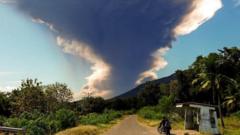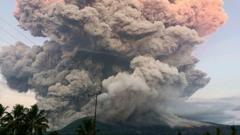Mount Lewotobi Laki-laki, known for its previous eruptions, exploded late Tuesday night, reminding locals of its dangerous potential.
**Fiery Eruption at Mount Lewotobi Laki-laki: Ash Clouds Rise into the Sky**

**Fiery Eruption at Mount Lewotobi Laki-laki: Ash Clouds Rise into the Sky**
A powerful volcanic eruption in Indonesia has sent massive ash plumes thousands of meters into the atmosphere, prompting safety warnings.
In a dramatic display of nature's power, Mount Lewotobi Laki-laki in southeastern Indonesia erupted late Tuesday night, ejecting a towering ash plume that reached approximately 5,000 meters, or 16,000 feet, into the sky. Witnesses reported that the volcanic ash, a thick gray layer, was visible from as far as 100 miles away.
Fortunately, no immediate injuries were reported following this latest eruption. However, the eruption follows a history of devastating consequences; a previous eruption last November led to the loss of 10 lives and triggered a series of earthquakes in the region. Videos captured at the moment of the eruption displayed the mountain erupting in a frightening explosion of smoke and flames, underscoring its volatility.
In response to the eruption, the Indonesian government's volcanic agency has issued a strong warning to communities nearby, advising residents to maintain a distance of at least four to five miles from the volcano. Concerns were raised regarding potential ash fallout and lava flows that could be exacerbated by rainfall.
Prior to the eruption, the region experienced a significant uptick in seismic activity, with 50 minor earthquakes detected within just a couple of hours, a stark contrast to the usual eight to 10 quakes seen in a day. Experts are closely monitoring the site for further seismic events.
Indonesia, an archipelago home to numerous active volcanoes, faces ongoing threats from such natural phenomena, making it imperative for residents to remain vigilant about volcanic activity. The name "Laki-laki," meaning "male," distinguishes this mountain from its sister volcano, Lewotobi Perempuan, which signifies "female" and is less frequently active.
Fortunately, no immediate injuries were reported following this latest eruption. However, the eruption follows a history of devastating consequences; a previous eruption last November led to the loss of 10 lives and triggered a series of earthquakes in the region. Videos captured at the moment of the eruption displayed the mountain erupting in a frightening explosion of smoke and flames, underscoring its volatility.
In response to the eruption, the Indonesian government's volcanic agency has issued a strong warning to communities nearby, advising residents to maintain a distance of at least four to five miles from the volcano. Concerns were raised regarding potential ash fallout and lava flows that could be exacerbated by rainfall.
Prior to the eruption, the region experienced a significant uptick in seismic activity, with 50 minor earthquakes detected within just a couple of hours, a stark contrast to the usual eight to 10 quakes seen in a day. Experts are closely monitoring the site for further seismic events.
Indonesia, an archipelago home to numerous active volcanoes, faces ongoing threats from such natural phenomena, making it imperative for residents to remain vigilant about volcanic activity. The name "Laki-laki," meaning "male," distinguishes this mountain from its sister volcano, Lewotobi Perempuan, which signifies "female" and is less frequently active.





















